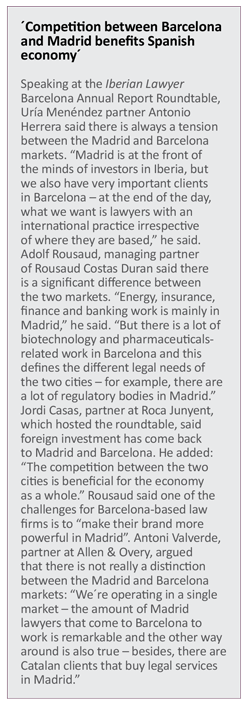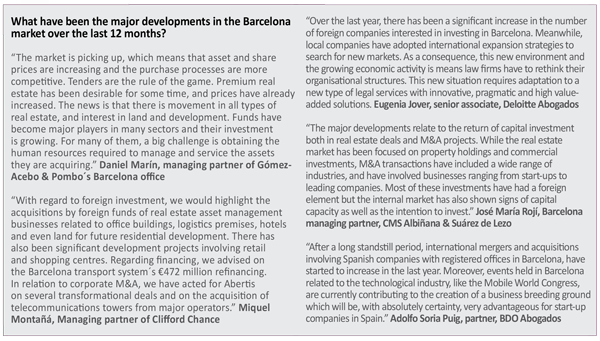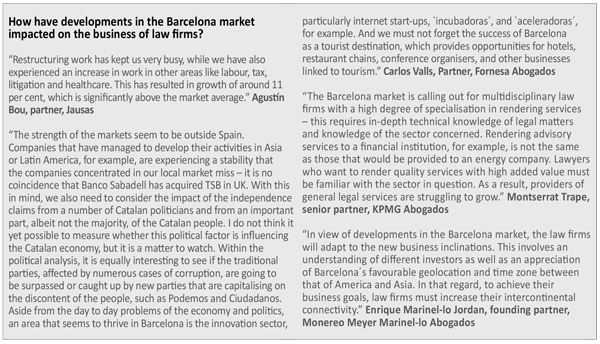Barcelona annual report 2015: Cutting ties?
Calls for an independent Catalonia grew louder in the last 12 months, while the identity of the next Spanish government is unclear with an election looming. Is political risk deterring investors?
It has been a big year for Barcelona and the wider Catalan region. Demands for Catalonian independence reached fever pitch as around two million people demostrated their support for the notion of a Catalan state. Lawyers say it is not yet clear what the impact of the independence movement has been on Barcelona´s economy, but some add that it is something that should be monitored.
Generally, the view taken on the city´s economic prospects is a positive one. Lawyers cite an increase in M&A activity, along with a decline in bankruptcy and insolvency work, as evidence of recovery. Foreign investors are keen to invest in the city and the Chinese, in particular, appear to have a strong appetite for M&A deals. However, political issues are never far from the surface, with lawyers saying that investors are asking questions about the possible outcome of the Spanish general election later this year – the prospect of a government run by the left wing Podemos party appears to be unsettling some investors.
Jordi Casas, partner at Roca Junyent, says there has been a recovery in corporate and M&A transactions with foreign investors “coming back”. He adds that there has been activity in the tourism, hotel and biotech sectors in this respect. Meanwhile, Casas says there has been fewer insolvencies, bankruptcies and financial restructurings. “With regard to prospects, there will be more transactional work, with interest from foreign investors in the US and Europe as well as conglomerates in China,” he adds. “There is also interest from Latin America in the banking and real estate sectors.”
Miguel Trías, managing partner of Cuatrecasas, Gonçalves Pereira´s Barcelona office says activity in Barcelona “accelerated” during the year. “There is now less insolvency and labour-related work and start-ups and tech businesses are on the rise,” he says. “Foreign investors are finding Spain attractive again – we now see industrial investment from Japan for the first time in ten years.” PwC partner Joan Daura says there are lots of Chinese companies looking for opportunities in Barcelona. “Chinese investors are often not used to investing in the western market and they have a different cultural way of doing business – there is also a different way of understanding fees for legal services,” he adds. 
Eager Chinese investors
According to Jorge Adell, partner at Baker & McKenzie, the M&A market has experienced substantial changes – not only in terms of its increased commoditisation – but also as a result of new type of investors arriving in the Spanish market, including investors from Asia and the Middle East. “Chinese investors have a lot of liquidity and a hunger for occupying strategic positions in certain European markets and industries,” he says. “These objectives sometimes cause them to change the order of processes – for instance, sometimes they acquire businesses first and carry out the due diligence investigations and remedy contingencies after closing, with the corresponding risks.” Gabriel Nadal, managing partner of Ecija´s Barcelona office, says “attention to new eastern markets which are receptive to the city and to what Catalonia might have to offer as a safe investment destination” is key to the firm´s business model and, he adds, is proving to be a profitable strategy.
Pintó Ruiz & Del Valle managing partner Jordi López says a significant recent change is that now Spanish clients have overcome their fear of investing and are now doing deals. Adolf Rousaud, managing partner of Rousaud Costas Duran, says the ‘new economy’ – businesses in sectors such as IT, pharma and bio-tech – were relatively unaffected by the crisis. He adds: “Entrepreneurs do not need a lot of capital to start up a business, meanwhile real estate prices are on the rise and family offices are looking for opportunities – companies that survived the crisis are looking to expand their businesses.”
According to Pérez-Llorca partner Sergio Agüera, there has been “movement in the capital markets”. He adds: “There have been new IPOs and this trend will continue, the issuing of bonds will also continue.” Antoni Valverde, partner at Allen & Overy, says there is considerable activity in Barcelona involving investors from the Far East and Middle East, he adds that clients in general – including local clients – are becoming “sophisticated users of legal services”. This point is echoed by Daura: “Legal and tax departments are more sophisticated in that they know more about the value of the company and they are more sophisticated in that they have more industry knowledge.”
Lawyers must be transparent
Casas says it is important that lawyers anticipate regulatory changes and then inform clients how the changes will affect their company. “Clients see you [lawyers] as a business partner – another change is that the contracting of legal services by clients is now done more often on a procurement model,” he adds. Casas says it is important for law firms to be transparent with clients. “Law firms have to distinguish their services – they have to be aware if the service is a commodity or whether it adds value – clients do appreciate that law firms have to be sustainable, and they appreciate having a law firm as a business partner provides stability. Trías says in-house legal teams are becoming more professionalised and the work that tends to be outsourced now is competition, litigation and M&A matters (largely because external law firms can provide big teams of lawyers). Rousaud says law firms now have to provide both commoditised and specialised services. “You have to be close to the client and you have to understand their business,” he adds.
According to Agüera, while fees are low for commoditised services, there has been a “recovery in fees” for high value-added services. López says clients now often want their lawyers to provide them – in relation to certain services – with an indication of the “maximum cost”, so that they can “plan the cost schedule” of their projects. Antonio Herrera, partner at Uría Menéndez, says that convincing a client that you add value is not something that comes naturally to lawyers. “We are not natural sellers but we need to embrace this,” he adds. “We are having conversations about this with key clients.”
PwC´s Daura says: “When we finish a job, we try to get an appraisal from the client – we want to find out if the client is happy and this is a good way to get a conversation going about fees, we find procurement departments have different ways of appraising the work done by their legal advisers.”
Brand awareness
Valverde says that although relationships continue to be crucial, brand is becoming a factor in clients´ decisions about which law firms they use. Rousaud says brand is a factor in clients’ choice of legal advisers, but he adds: “It’s more important to form a relationship based on trust with them, while price is also a consideration.” Herrera argues sophisticated clients don´t look at a law firm´s brand, they look at the record of the lawyer.
López believes lawyers should make the effort to explain the value of their services. He says the “onus is on us to follow-up with clients – we need to show them that what they got was something successful relative to the cost”. One partner adds that clients often fail to understand the added value lawyers provide. “Clients tend to minimise what you do,” he says.
Rousaud says that retroactive changes in regulations – such as those affecting the energy sector – creates “economic harm”. One partner says that clients are often left frustrated by the Spanish court system and the time it takes for decisions to be made. “The independence of our judiciary is ranked low,” he adds.
Trías says that the administration of justice in Spain is independent and “basically honest” – he adds that the problems with the judicial system are a “matter of efficiency”. Trias says: “I´ve never found a corrupt judge. The administration of justice is slow, but it is not corrupt.” One partner says the perception of corruption in the judicial system is an issue in that it may harm Spain´s international reputation. Agüera says the problem is that there is not enough people working in the judicial system.
 Weak euro helping exports
Weak euro helping exports
Trías believes that after a number of years of stagnation, 2015 will be a year of growth. Agüera says that he has not seen a client not invest because of “political risk”. Another partner remarks: “Two years ago, there was talk of Spain exiting the euro – now the euro is going down, but this is helping exports – we [Spain] are part of the EU, so part of our budget is already decided. We’re not exporting oil. We´re not relying on one particular resource. We´re not going to turn into Venezuela. Nothing will happen in the next year. People talk about the real economy, and, yes, the unemployment rate in Spain is a disaster, but I don´t make money out of the real economy, I make money out of the capital markets.” With regard to fees, Rousaud says that, at the beginning of the crisis, refinancing work was well paid, but over time this has become a commoditised service. Daura says litigation and tax work is increasing and that “the last semester of the year [2014] was good” – he adds that capital markets activity is increasing.”
With the US Treasury Department and US Commerce Department having recently eased relations with Cuba by amending regulations relating to Cuban exports, clients are now looking at how they can capitalise on opportunities in Cuba before competition from US companies stiffens. One partner says: “We have clients we advise on Cuba – they want to understand how they can be in Cuba before their competitors from the US.” However, other firms are taking a more cautious approach, with one partner reporting that his firm´s policy is not to advise clients on investment in Cuba due to its activities in the US.
With regard to Africa, Casas says: “Having the right contacts in these areas is very important as you have to anticipate the administrative processes.” In the case of Latin America, Herrera says that the countries in the Pacific Rim currently have a more promising economic outlook than the traditional heavyweights in the region, namely Argentina and Brazil. Regarding Uría´s recent involvement in the merger of law firms in Chile and Colombia to create Philippi, Prietocarrizosa & Uría – which began operations on 1 January 2015 – he says the respective economies are “very integrated”. He adds: “For example, the Chilean, Colombian and Peruvian stock exchanges have merged – Philippi, Prietocarrizosa & Uría is a huge development for us.”
 The innovation challenge
The innovation challenge
Casas says 2015 will mark a recovery for cyclical legal practices such as corporate and M&A, and real estate. “We are seeing less restructurings and insolvency,” he adds. Trías says the challenge for law firms is innovation and technology, as well as creating a work-life balance for lawyers. López says the biggest opportunities for law firms are to be found in M&A and real estate, while the outlook for IT companies, start-ups, and sports-related work is promising.
Adell says that tax is one of the practice areas that has experienced high growth in recent months and he expects it will continue to grow. He adds: “Another important area of growth is support and advice to Spanish multinational groups making investments abroad, not only for exporting, where the advice they require is limited, but mainly on the acquisition of local businesses and on ´green field´ investments.” Adell adds that, at an “office management level”, one of the key challenges for Spanish firms is to ensure the implementation of diversity and inclusion policies that help to retain talent and offer lawyers a balance between work and personal life.
Herrera says the last five or six years have served as an education for law firms and their clients. “We have all benefitted, we are now better firms and we are better focused on clients,” he adds. Valverde says the downturn has “streamlined” the legal sector and now there will be a greater fight among firms for talent. Agüera says: “This is the end of the crisis, we will have confirmation in 2015 of a new phase of expansion. There will be a few new foreign investors – additionally, we have confidence in Spanish investors and family-owned companies.” Daura says there is potential for law firm growth if firms innovate and become business consultants as well as good lawyers, as well as becoming global.
There are the early indications of the possible re-emergence of “feel good factor” in Barcelona as M&A activity picks up, foreign investors inject new money, and the city´s reputation as a centre for the “new economy” grows. While, some clients are expressing concerns about the possible “political risk” associated with a change of government in Spain later this year, there is considerable confidence that, by and large, investors’ interest in Barcelona will continue to grow.












